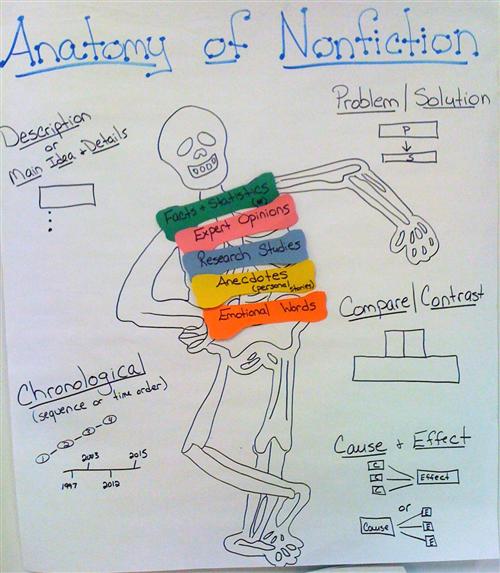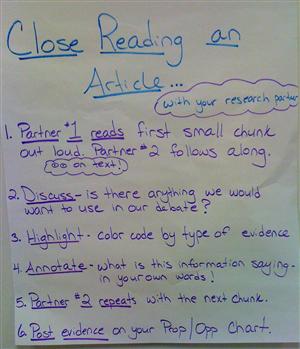- Joseph R. Bolger Middle School
- Current Unit - Nonfiction Reading
Mankowski, Jessica
Page Navigation
-
Reading Nonfiction and Research for Debate
Phase 1: ResearchThese are the assignments you will submit for a grade while we are reading and researching nonfiction articles.Due Wednesday, March 4!!!Criteria
Description
Points Earned
5 Point Summary – Source # 1 (article)
Using the notes your research team took from the article, write a summary that includes all the elements in the rubric.
/5
5 Point Summary – Source #2 (article)
/5
5 Point Summary – Source #3 (video)
/5
Expert Vocabulary Page
W.7.2d
List and define at least 5 words in your notebook that are technical words specific to your topic. You must use these words in your argumentative essay and in your presentation.
/5
Comparing Authors Entry
RI.7.9
Write an entry that compares and contrasts how two different authors wrote about your topic.
/5
Know what to search for! Here is the "anatomy" of nonfiction - the types of evidence we search for:


- figure out what to look for in the text
- choose the best way to take notes
ArticlesVideo Games are a Waste of Time School Sports Cause More Harm than GoodChocolate Milk Should be Banned in School Cafeterias5 Point SummaryWatch Mrs. Mankowski demonstrate how to write a 5 Point Summary: http://www.youtube.com/watch?v=QFu1agnW5341 Point
1 Point
1 Point
1 Point
1 Point
One central idea (RI.7.2)
Sounds like:
The central idea of this text/passage/ article is…
Another central idea (RI.7.2)
Sounds like:
Another idea expressed in this text is…
Several quotes and pieces of textual evidence from all over the text support the central idea (RI.7.1)
Looks like:
Transitions show that evidence comes from the text, and that the evidence proves the main idea as well as inferences about the text. (RI.7.1, W.7.2)
Sounds like:
According to…
The text states that…
The author says…
Another example that supports this idea is…
Summary considers the author’s point of view or purpose (RI.7.5, RI.7.6)
Sounds like:
This detail shows…
This explains…
This shows how the author…
The author most likely includes this detail to demonstrate how…
Expert Vocabulary EntryWatch Period 1 figure out what expert vocabulary is, how to find expert vocabulary on your topic, and create the Expert Vocabulary Entry. http://youtu.be/AGwvW6lNecgCompare/Contrast EntryWatch this PowerPoint before you write your Compare/Contrast Entry!!!!Criteria: (type of evidence the author uses or structure of the text):
Lead Sentence
(include the titles of the 2 sources, a compare/contrast term, and the criteria you are comparing)
Possible Transition:
One example
One way
Evidence
Example from Source #1
Possible Transitions
In paragraph
According to the author
The expert says
Example from Source #2
Possible Transitions
In paragraph
According to the author
The expert says
Compare/Contrast Sentence:
(Dig deep: What is really similar or different here?)
Compare:
Both
Same
Similar
Contrast:
However
While
On the other hand
Explanation:
(Dig deep again: What does this show about how authors teach us through nonfiction?)
Possible Transitions:
This shows
This explains
This demonstrates
This meansConducting an InterviewThe expert you interview will use this rubric to evaluate you on your interviewing technique.As you watch Mrs. Mankowski interview her son, Lucas, about his favorite video game, pay attention to two things in particular:1. How to open and close the interview (manners!)2. The kinds of questions Mrs. Mankowski asks

